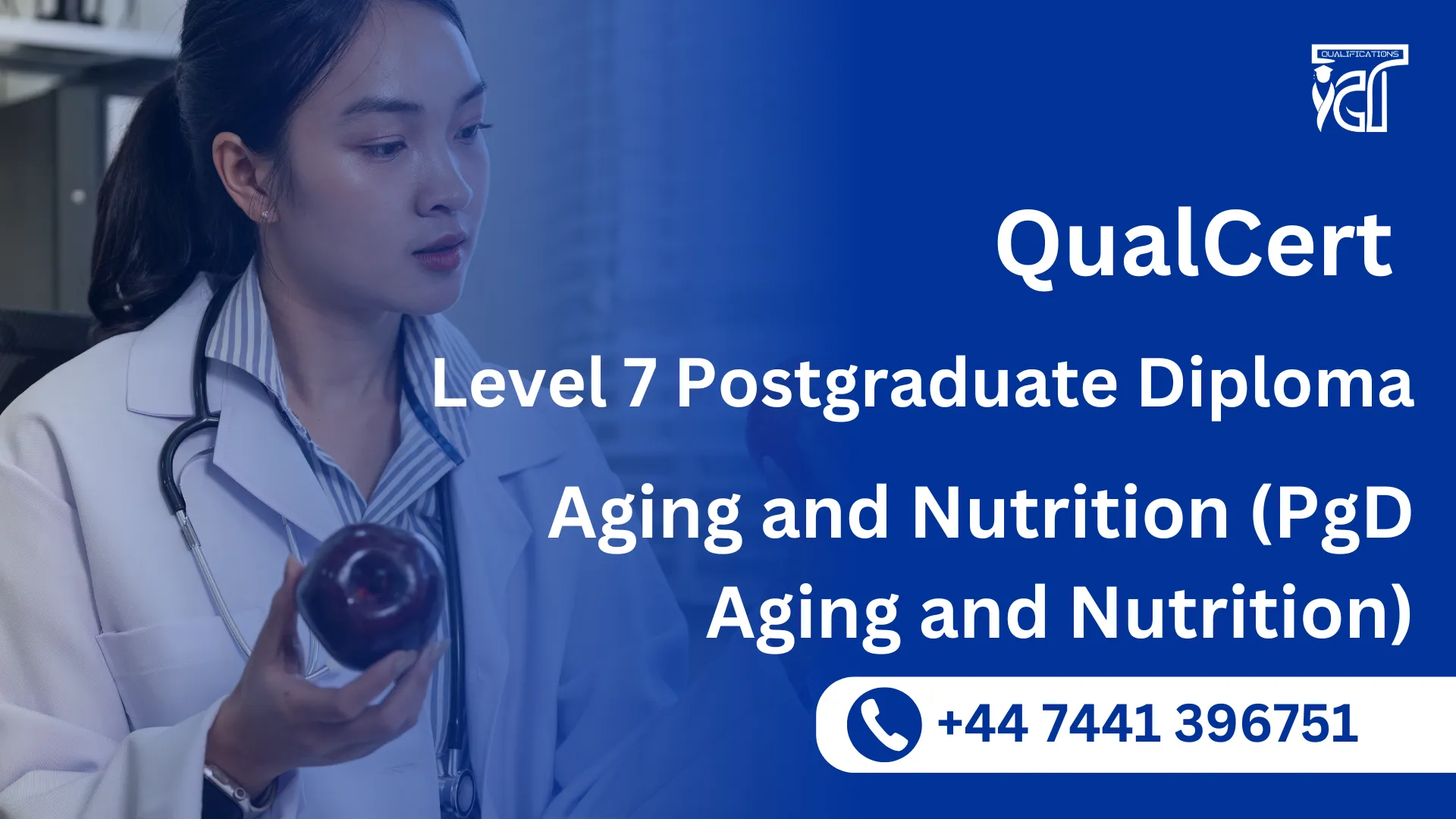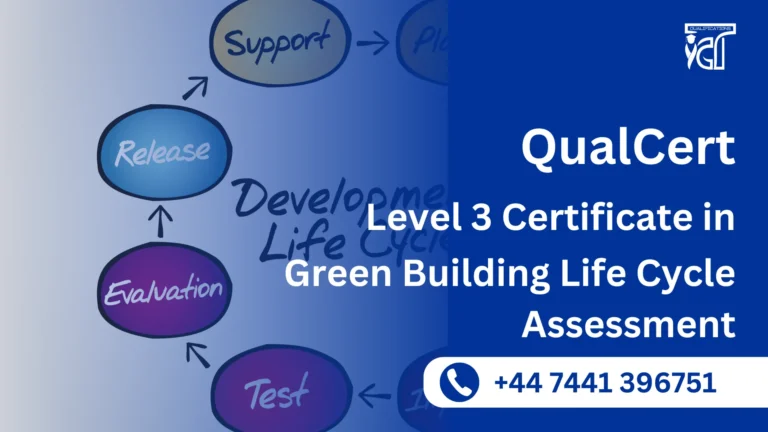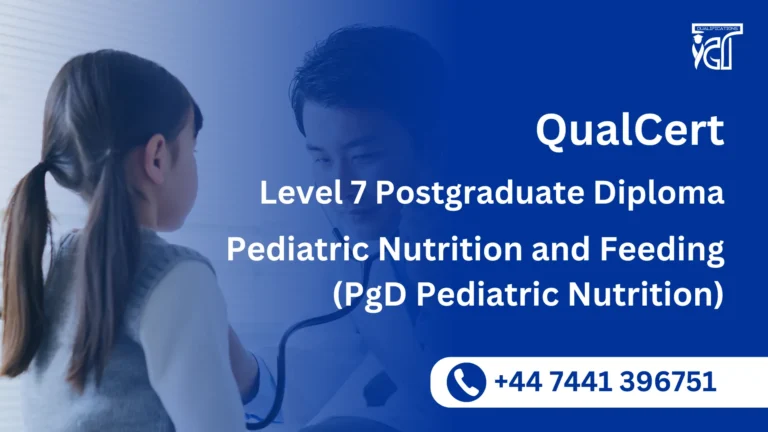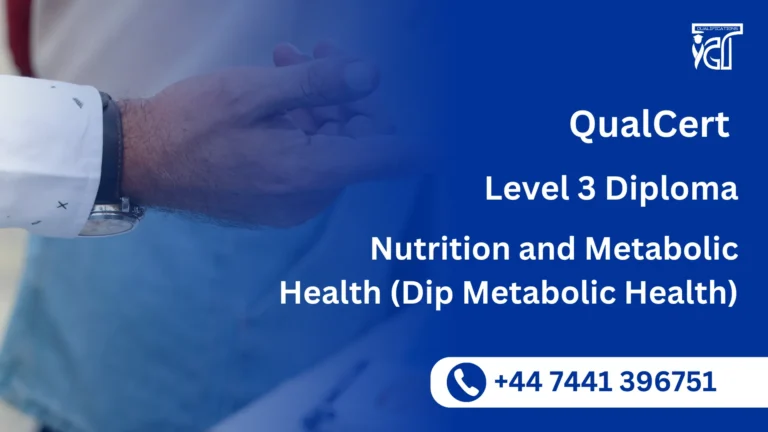The QualCert Level 7 Postgraduate Diploma in Aging and Nutrition is a specialized qualification designed to address the complex relationship between aging, nutrition, and overall well-being. As populations worldwide experience significant demographic shifts with increasing life expectancy, the importance of nutrition in promoting healthy aging has become a critical area of study. This program provides learners with advanced knowledge of nutritional science, gerontology, and public health, equipping them to understand how dietary practices influence physical, cognitive, and emotional health in later life.
The course explores the physiological changes that occur with aging and their impact on nutritional requirements, metabolism, and disease prevention. Learners will examine evidence-based approaches to managing age-related conditions such as osteoporosis, cardiovascular disease, diabetes, and cognitive decline through tailored nutritional strategies. In addition, the program emphasizes the role of nutrition in enhancing quality of life, independence, and resilience among older adults, while also considering cultural, social, and ethical dimensions of food and health in aging populations.
A key feature of this diploma is its integration of theory with practical application. Learners will engage with case studies, research projects, and policy frameworks to develop critical skills in assessing nutritional needs, designing interventions, and evaluating outcomes for diverse aging communities. The curriculum also highlights global perspectives on aging and nutrition, preparing participants to contribute to international initiatives in healthcare, community development, and sustainable food systems. By combining scientific rigor with applied practice, the program ensures learners are capable of addressing real-world challenges in aging and nutrition.
Ultimately, this qualification serves as a pathway for professionals seeking leadership roles in healthcare, nutrition consultancy, research, and policy development. It empowers learners to become advocates for healthier aging, capable of shaping strategies that support longevity and well-being across societies. With its advanced focus on both individual and population-level nutrition, the PgD Aging and Nutrition equips participants to make meaningful contributions to improving the lives of older adults and advancing the field of nutritional gerontology.
QualCert Level 7 Postgraduate Diploma in Aging and Nutrition (PgD Aging and Nutrition)
The QualCert Level 7 Postgraduate Diploma in Aging and Nutrition (PgD Aging and Nutrition), offers 120 Credits, requiring a Total Qualification Time (TQT) of 1200 hours, including 600 Guided Learning Hours (GLH).
| Unit Ref# | Unit Title | Credit | GLH | TQT |
| QC29128- 1 | Advanced Nutritional Science for Older Adults | 20 | 100 | 200 |
| QC29128-2 | Assessment and Management of Nutritional Status in Aging | 20 | 100 | 200 |
| QC29128-3 | Chronic Disease Prevention and Management through Nutrition | 20 | 100 | 200 |
| QC29128-4 | Food Safety, Hygiene, and Practical Nutritional Planning for Older Adults | 20 | 100 | 200 |
| QC29128-5 | Public Health, Policy, and Nutrition in Aging Populations | 20 | 100 | 200 |
| QC29128-6 | Research Methods in Aging and Nutrition | 20 | 100 | 200 |
GLH (Guided Learning Hours) and TQT (Total Qualification Time) are terms commonly used in vocational qualifications to help define the amount of time a learner is expected to spend on their studies.
1. GLH (Guided Learning Hours)
GLH refers to the number of hours a learner spends being directly taught, supervised, or supported during their course. This includes the time spent in activities such as:
- Classroom instruction
- Practical workshops
- One-on-one tutoring or mentoring sessions
- Online learning sessions with tutor support
In other words, GLH represents the time that learners are actively engaged with their instructors or learning activities.
2. TQT (Total Qualification Time)
TQT represents the total amount of time a learner is expected to invest in completing a qualification, including:
- GLH (Guided Learning Hours): Time spent on direct learning, as explained above.
- Self-Directed Learning: This includes time spent on independent study, research, assignment completion, preparation for exams, and any other work the learner does outside of direct teaching hours.
TQT is a broader measure that includes all the time required to achieve the qualification. It helps learners and employers understand the overall commitment required for the qualification.
Key Differences Between GLH and TQT:
- GLH focuses on direct learning with guidance or supervision.
- TQT includes GLH as well as independent study time and other learning-related activities.
Example:
If a qualification has a TQT of 600 hours and a GLH of 250 hours, it means the learner should spend 250 hours in direct learning (classroom, online, or tutor-led sessions) and 350 hours on independent study or research.
Learning Outcomes for the QualCert Level 7 Postgraduate Diploma in Aging and Nutrition (PgD Aging and Nutrition):
Advanced Nutritional Science for Older Adults
- Evaluate the physiological and metabolic changes associated with ageing
- Analyse nutritional requirements for older adults to support health and longevity
- Apply evidence-based nutritional strategies to prevent age-related deficiencies
- Critically appraise scientific literature relevant to ageing and nutrition
Assessment and Management of Nutritional Status in Aging
- Conduct comprehensive nutritional assessments for older adults
- Identify risks of malnutrition and implement appropriate interventions
- Develop personalised dietary plans to meet individual or group needs
- Monitor and evaluate the outcomes of nutritional interventions
Chronic Disease Prevention and Management through Nutrition
- Examine the role of nutrition in preventing age-related chronic diseases
- Develop dietary strategies to manage conditions such as diabetes, cardiovascular disease, and osteoporosis
- Critically assess evidence-based interventions for disease prevention and management
- Apply knowledge to improve the health outcomes of older populations
Food Safety, Hygiene, and Practical Nutritional Planning for Older Adults
- Identify microbiological hazards and contamination risks in food for older adults
- Apply safe food handling and hygiene practices in care settings
- Design practical dietary plans to meet the nutritional needs of ageing populations
- Evaluate strategies to enhance dietary intake and food safety in older adults
Public Health, Policy, and Nutrition in Aging Populations
- Critically evaluate national and international policies on ageing and nutrition
- Analyse public health strategies aimed at improving older adult nutrition
- Formulate evidence-based recommendations for policy or programme development
- Advocate for initiatives that promote healthy ageing within communities
Research Methods in Aging and Nutrition
- Design and implement research projects in ageing and nutrition
- Collect, analyse, and interpret quantitative and qualitative data
- Apply research findings to inform evidence-based nutritional practice
- Prepare professional research reports following academic and ethical standards
This advanced diploma offers a wide range of benefits for learners who wish to specialize in the intersection of aging and nutrition. It not only enhances professional expertise but also provides practical tools to address the nutritional needs of aging populations. The program is designed to support career growth, research opportunities, and leadership roles in healthcare, nutrition, and policy development.
Enhanced Knowledge and Expertise
- Gain in-depth understanding of the physiological changes associated with aging and their nutritional implications
- Learn evidence-based strategies to prevent and manage age-related health conditions through nutrition
- Develop advanced skills in nutritional assessment, intervention design, and outcome evaluation
- Explore global perspectives on aging and nutrition, preparing for international practice and research
Practical Application and Skills Development
- Apply theoretical knowledge to real-world case studies and community-based projects
- Strengthen analytical and problem-solving skills for addressing complex nutritional challenges in older adults
- Acquire competencies in policy analysis, program development, and public health nutrition
- Build confidence in delivering tailored nutritional guidance across diverse cultural and social contexts
Career Advancement Opportunities
- Open pathways to leadership roles in healthcare, nutrition consultancy, and gerontology research
- Enhance employability in hospitals, care facilities, NGOs, and government health departments
- Position yourself as a specialist in aging and nutrition, a growing field with global demand
- Gain recognition through a respected Level 7 qualification that supports progression to higher academic or professional routes
Contribution to Society and Research
- Play a vital role in improving the quality of life for aging populations
- Contribute to sustainable health strategies that promote longevity and independence
- Engage in research that advances the field of nutritional gerontology and public health
- Become an advocate for healthier aging through evidence-based nutrition practices and policies
This program is designed for individuals who are motivated to specialize in the field of aging and nutrition, combining scientific knowledge with practical application. The ideal learner is someone who seeks to enhance their expertise, advance their career, and contribute meaningfully to the health and well-being of aging populations. Just as the course benefits highlight professional growth and societal impact, the learner profile reflects those who are ready to embrace these opportunities.
Learners Seeking Advanced Knowledge and Expertise
- Individuals with a strong interest in understanding the physiological and nutritional aspects of aging
- Those eager to apply evidence-based strategies to manage age-related health conditions
- Learners motivated to develop advanced skills in nutritional assessment and intervention design
- Candidates who value global perspectives and wish to engage with international practices in aging and nutrition
Learners Focused on Practical Application and Skills Development
- Professionals who want to translate theory into practice through case studies and community projects
- Those aiming to strengthen analytical and problem-solving skills in complex nutritional contexts
- Learners interested in policy analysis, program development, and public health nutrition initiatives
- Participants who seek confidence in delivering tailored nutritional guidance across diverse populations
Learners Aspiring for Career Advancement
- Healthcare practitioners, nutrition consultants, and researchers aiming for leadership roles
- Professionals seeking employability in hospitals, care facilities, NGOs, and government health departments
- Individuals wishing to position themselves as specialists in aging and nutrition, a growing global field
- Learners who value a respected Level 7 qualification as a pathway to higher academic or professional routes
Learners Committed to Societal Contribution and Research
- Those passionate about improving the quality of life for older adults
- Learners who want to contribute to sustainable health strategies that promote independence and longevity
- Individuals motivated to engage in research that advances nutritional gerontology and public health
Completing the QualCert Level 7 Postgraduate Diploma in Aging and Nutrition opens multiple pathways for learners to advance academically, professionally, and personally. This qualification is designed not only to provide specialized expertise but also to act as a stepping stone toward higher-level certifications, research opportunities, and leadership roles in healthcare, nutrition, and gerontology.
Academic Progression
- Progression to Level 8 qualifications such as Doctoral studies or professional research programs in nutrition, public health, or gerontology
- Eligibility to pursue advanced certifications in dietetics, clinical nutrition, or health sciences
- Opportunity to contribute to scholarly publications and research projects in aging and nutrition
- Access to international academic collaborations and conferences focused on aging populations
Professional Advancement
- Pathways to senior roles in healthcare institutions, care facilities, and nutrition consultancy firms
- Opportunities to work with NGOs, government health departments, and international organizations addressing aging and nutrition challenges
- Enhanced career prospects in policy development, public health strategy, and community nutrition programs
- Recognition as a specialist capable of leading initiatives that improve the health and well-being of older adults
Research and Development Opportunities
- Engagement in applied research projects that explore innovative nutritional interventions for aging populations
- Contribution to evidence-based practices in gerontology and nutritional science
- Development of new frameworks for sustainable food systems and healthy aging strategies
- Collaboration with universities, research centers, and healthcare organizations on global aging issues
Societal Impact and Leadership
- Ability to influence public health policies and advocate for healthier aging practices
- Contribution to designing community programs that promote independence and longevity among older adults
- Leadership in shaping international strategies for aging populations through nutrition-focused solutions
- Empowerment to become a thought leader in the growing field of nutritional gerontology
Entry Requirements
Entry Requirements for the QualCert Level 7 Postgraduate Diploma in Aging and Nutrition (PgD Aging and Nutrition):
- Age: Learners must be at least 21 years old, ensuring an appropriate level of maturity for postgraduate study.
- Education: Completion of a Level 6 qualification (or equivalent) in nutrition, health sciences, biology, or a related discipline.
- Work Experience: A minimum of 2–3 years of relevant work experience in healthcare, nutrition consultancy, public health, or community services.
- English Proficiency: Competence in English or the language of instruction, typically at CEFR Level B2 or equivalent. Ability to read, write, and communicate effectively in academic and professional contexts
Register Now
Qualification Process
Qualification Process for the QualCert Level 7 Postgraduate Diploma in Aging and Nutrition (PgD Aging and Nutrition)
- Self-Assessment:
Begin by evaluating your eligibility to ensure you meet the qualification requirements, including work experience, knowledge, and language proficiency. - Registration:
Complete your registration by submitting the required documents, including a scanned copy of a valid ID, and paying the registration fee. - Induction:
An assessor will conduct an induction to confirm your eligibility for the course and explain the evidence requirements. If you do not meet the criteria, your registration will be canceled, and the fee will be refunded. - Assignmnets & Evidence Submission:
Provide all assignmnets and the necessary evidence based on the assessment criteria outlined in the course. If you are unsure of the required evidence, consult with the assessor for guidance on the type and nature of evidence needed. - Feedback and Revision:
The assessor will review your submitted evidence and provide feedback. Evidence that meets the criteria will be marked as “Criteria Met,” while any gaps will be identified. You will be asked to revise and resubmit if needed. - Competence Evidence:
Submit final evidence demonstrating that all learning outcomes have been met. This evidence will be marked as “Criteria Met” by the assessor once it is satisfactory. - Internal Quality Assurance (IQA):
The Internal Quality Assurance Verifier (IQA) will review your evidence to ensure consistency, quality, and compliance with standards. - External Verification:
The IQA will submit your portfolio to QualCert External Quality Assurance Verifiers (EQA) for final confirmation. The EQA may contact you directly to verify the authenticity of your evidence. - Certification:
Upon successful completion of all checks, QualCert will issue your official certificate, confirming that you have attained the QualCert Level 7 Postgraduate Diploma in Aging and Nutrition (PgD Aging and Nutrition).







